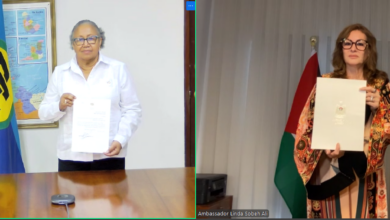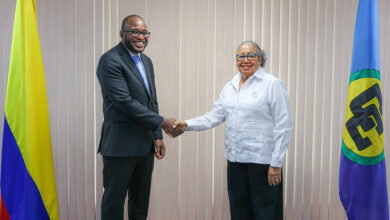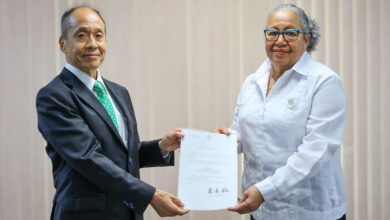Your Excellencies the Presidents of Guyana and Suriname
Colleague Heads of Government,
Honourable Ministers,
Representatives of Regional Organisations
Senior Government Officials,
Representatives of the Private Sector,
Ladies and Gentlemen,
Good Morning,
I am very pleased to welcome you back to The Bahamas and to Paradise Island where many of us gathered just seven weeks ago. We were here to assess the falloff in tourism and, hence, in our economies, resulting from the horrific events of September 11th, and to chart a course forward; hence, there is much work to do as we meet to further examine our status and to plan strategies for the next 12 – 18 months..
Almost a decade ago, Heads of Government of the Caribbean Community, with tremendous foresight, met in Kingston, Jamaica to assess Caribbean Tourism; to measure its importance to regional economies; and to gauge how improved cooperation among Caribbean destinations and between public and private sectors could work to the benefit of all. Very particularly, from the vantage points of Governments, consideration was given to how greater benefit could be derived from the tourism industry for our economies with special reference to employment.
That historic first Tourism Summit properly identified tourism as the industry of the future. Unfortunately for Caribbean tourism, we have not been faithful to the Kingston Agreements, especially as regards two agreements; firstly to meet every two to three years to address matters of importance to the tourism sector; and secondly, for Caribbean public and private sectors to create a pool of funds to promote the region as a destination.
Colleague Heads,
We are fortunate to have one of the world’s most appealing names for vacationers, “The Caribbean”. The term Caribbean conjures up in the minds of people across the globe, images of bright sunshine, pristine seas filled with marine life, sandy beaches and lush green mountains, cool, clear running rivers and tropical rainforests, and, it brings to mind sounds and sights of music, art, literature and sculpture.
Our sometimes casual attitude toward tourism has had much to do with the continued difficulty which classically trained economists and financial experts have in recognizing vacation as an industry. We cannot, however, continue to make this mistake because, very clearly, the aspect of Caribbean economies which has proved most successful in creating employment and in growing the foreign reserves of regional countries over the past decade has been tourism. Indeed, in recent years, tourism has proven to be more reliable an employer than have the traditional natural resources and agricultural export sectors.
We would be wise to note that the developed world, whose economists also once questioned whether something as ‘fickle’ as tourism might be properly termed an ‘industry’ have, over the past decade, come to the realization that tourism is, in fact, the world’s fastest growing industry, a significant employer and an important contributor to economic growth and stability. Unlike us, these countries have poured millions of dollars into packaging , promoting and selling their tourism products.
The world Tourism Council maintains that tourism accounts for 30% of GDP of the Caribbean region and for 25% of employment. For countries such as my own, those numbers are even more staggering; indeed, we have come to accept that tourism is The Bahamian economy.
Increased competition and reduced market share from a sector which too many of us took for granted for too long, has convinced us that a Second Tourism Summit was warranted. Our decision was none too soon.
We all understood that this meeting was necessary before September 11th. Since that terrible day it became even more essential. Clearly, if we are to harness the full potential of tourism, if we are to maximise its benefits as stimulus for the development of other sectors of our economies – agriculture, fisheries, food processing, manufacturing, construction, and light industry; and, if tourism is to play the important and continuing role in the economic development of our member states that we believe it should, then we must ensure that it is properly managed and made sustainable.
While near-term concerns of recession in the global economy and the fallout from the fear of travel which arose following the terrorist attack in North America must necessarily occupy our attention, it is as important that we focus on issues critical to the efficient and profitable operation of our tourism sectors. We must be even more careful to plan for the many eventualities we are likely to face and to realistically manage.
And so, I do hope that we can spend much of our time here reviewing the structural problems which impact Caribbean tourism and which we must address to ensure that our private sector partners continue to invest, to operate and to be profitable in our countries.
Two critically important issues upon which we must concentrate are:
- the challenges both to and arising from land-based tourism (including all-inclusive hotel properties) and cruise-ship tourism; and
- environmental challenges posed by tourism, particularly large-scale tourism and acceptable methods of cooperation between the public and private sectors to ensure the environmental sustainability of our tourism industry.
In addition, we must also address issues which impact our image in the market place, and our ability to service tourism. I refer, in this regard, to the need for focussed attention on seven very specific issues:-
Firstly,
- Safety and security – This critically important necessity cannot be overstated. It is always important because no one wishes to have to be ‘on his/her guard’ when on vacation, especially following upon the terrorists attack in North America. Personal security has taken on a far more important role not only at ports of entry and on vehicles of transportation, but also at all places where groups of people gather. And of course, safety includes safe drinking water, safe food and safe environments.
Secondly,
- Product quality – Are our hotels equipped with the amenities demanded and expected by visitors and is the environment – natural and manmade – well maintained and protected? Will visitors believe that they have received value for money for vacations spent in our destinations? Visitors to our countries pay for hotels, taxis, restaurants and for attractions – most belonging to the private sector. They, therefore, expect clean and efficient ports, good roads, a clean environment and welcoming people. And, they expect welcoming, friendly and efficient service. They do not really care whose responsibility it is to ensure that each of these goods and services meets their expectations. What they require is a desired standard. And what we must do is ensure that our customers are satisfied.
Thirdly,
- Human resource development – Are our people qualified and trained to assume the full range of positions necessary to make tourism efficient, enjoyable and profitable? Are we succeeding in channelling our best and brightest into tourism; do we fully appreciate the wide gamut of expertise required to service the tourism sector? And do we spend enough time educating our people to be supporters of tourism by being friendly, courteous and welcoming to the millions whom we invite to spend their vacation with us as paying guests?
Fourthly
- Research and information – We can no longer operate our tourism industry by the ‘seat of our pants’ prescriptions. Human relations is a well defined field. We can learn who our visitors are, who are most likely to be attracted to our destinations and what their expectations are likely to be, and then use that information to strengthen our sector. Very importantly, we do not need to do this individually; regional studies will produce the same information and at lower cost to each destination – studies which can guide our planning and programming and assist us in devising appropriate evaluation instruments.
Fifthly,
- Promotion and Marketing – Heads of Government got this right in 1992; and we agreed in October to re-start efforts at greater cooperation and collaboration in marketing initiatives. Clearly, each of us does not need to entertain and educate the same travel agents and travel writers. How much more cost effective would it be if we jointly hosted Caribbean promotional campaigns with each of us present. The need and importance of effective promotion of our region cannot be overemphasized. Already the Caribbean registers positively with those segments of the public choosing to travel. We need to ensure that the Caribbean has a voice in the right markets in all segments of the media – TV, radio and print – throughout the year.
Sixthly,
- Transport and communication
Here we must consider airlines, the cruise industry and telecommunications. Airlines – the partnership between Caribbean destinations and international airlines is critical to the continued success of Caribbean tourism because our own regional carriers are in no position to bear the brunt of the demand and in any event, they will need to share this market with the international carriers.
Cruise industry – We in the Caribbean must come to terms with the cruise industry: it is, I believe, a critical and essential element of our tourism product. Increasingly popular with young professionals, families and retired persons, cruise tourism can play an important economic role in bolstering retail businesses, and increasing demand for excursions and local attractions.
Telecommunications – in today’s world where business and commerce and private correspondence are all conducted somewhere in cyberspace, it is increasingly important that Caribbean countries move on-line.
Finally,
- Cost – We must remain cost competitive. Otherwise our efforts will not attract and retain faithful return visitors.
Ladies and Gentlemen,
I am told that numerous studies show that when people think of taking a trip they visualize many different places for many different reasons. But, when those same people think of taking a vacation, they frequently consider the Caribbean. Indeed, the Caribbean is often thought of more positively than any of its component parts. This points to the wisdom of adopting regional promotion and advertising.
Such studies also show that persons coming to the Caribbean tend to be “island collectors”; they wish to visit as many islands as possible notwithstanding how much they may enjoy any particular island. Not a bad predisposition if we are seeking to have our visitors return to the region, and to our diverse islands, again and again!
I believe that, notwithstanding other shortcomings, it is to our credit that when people think of vacation in the Caribbean they think of our countries positively as they have a good impression of us. And, once they have visited one of us, they are game to visit another.
Colleague Heads,
We can no longer delay strong, affirmative action. We must build strategies to ensure that our tourism benefits from such propensities on the part of the travelling public. We must put in place and implement policies to make hassle-free vacations commonplace in the Caribbean. We must join with our partners in the airline and cruise ship businesses to maximise interest in our region. We must implement training programmes with our sector partners to maximise the employment of our nationals at all levels of the tourism industry. We must deepen the value added in our tourism product using tourism as the stimulus for stronger linkages to other productive sectors of our economy. Most importantly, we must agree that tourism is a ‘front burner’ item for Caribbean Governments.
Let us continue to build on our successes and enlarge the scope of our building as we proceed..
Thank you.





